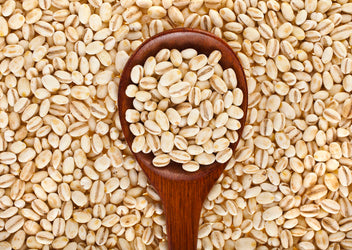No Products in the Cart

Fiber supports good health by helping your body reduce cholesterol and control blood sugar levels. It also helps with constipation and bowel issues, maintains healthy gut bacteria, and aids in weight control. The Mayo Clinic recommends that men and women ages 50 and under eat 38 grams (g) and 25 g per day, respectively. Men and women ages 51 and over should get 30 g and 21 g per day. Teenagers may need 30 to 35 g a day. (1)

Beta-glucans are sugars that are found in the cell walls of bacteria, fungi, yeasts, algae, lichens, and plants, such as oats and barley. They are sometimes used as medicine.
Beta-glucans are taken by mouth for high cholesterol, diabetes, cancer, HIV/AIDS, high blood pressure, and canker sores. Beta-glucans are also taken by mouth to boost the immune system in people whose body defenses have been weakened by conditions such as chronic fatigue syndrome; physical and emotional stress; or by treatments such as radiation or chemotherapy. Beta-glucans are also taken by mouth for colds, influenza (flu), swine flu, respiratory tract infections, allergies, hepatitis, Lyme disease, asthma, ear infections, aging, ulcerative colitis and Crohn's disease, irritable bowel syndrome, pain after surgery, fibromyalgia, rheumatoid arthritis, and multiple sclerosis.
People apply beta-glucans to the skin for dermatitis, eczema, wrinkles, bedsores, wounds, burns, diabetic ulcers, and radiation burns.
Healthcare providers sometimes give beta-glucans by IV (intravenously) or by injection into the muscle to treat cancer and to boost the immune system in people with HIV/AIDS and AIDS-related conditions. Beta-glucans are also given by IV to prevent infection in people after surgery.
Healthcare providers sometimes give beta-glucans by a shot under the skin (subcutaneously) for treating and reducing the size of skin tumors resulting from cancer that has spread.
In manufacturing, beta-glucans are used as a food additive in products such as salad dressings, frozen desserts, sour cream, and cheese spreads. (2)
Because it’s a soluble fiber, beta-glucan slows down food transit in the intestines. This means that it takes longer for the body to digest food. Slower digestion means the body doesn’t absorb sugar as quickly, reducing the likelihood of blood sugar spikes and helping keep blood sugar levels stable. Beta glucan is indigestible, so it goes through the whole digestive tract. As it travels through, it can take cholesterol out with it, lowering levels.

There’s solid evidence that beta glucan can boost heart health. The U.S. Food and Drug Administration (FDA) has approved a heart-healthy label for foods that have high amounts of beta glucan, based on this evidence. Several studies suggest that beta glucan may lower cholesterol and triglycerides. One found that eating oats with at least 3 g of beta glucan daily reduced bad cholesterol (LDL) levels between 5 and 7 percent.

It may help reduce the risk of type 2 diabetes. It may also improve blood sugar control for those who already have diabetes.

Researchers believe that beta glucan could have some positive effects on the immune system. However, more research is necessary. Most research to date has been in the form of animal trials. Scientists think beta glucan may be able to stimulate the immune system and help the body fight off disease and infection more effectively. However, the human immune system is complicated and researchers are still learning how it works. It may take some time before we know the exact effects beta glucan has and if it can improve immune system function. (1)
Mushrooms contain biologically active polysaccharides that mostly belong to a group of beta-glucans. These substances increase host immune defense by activating complement system, enhancing macrophages and natural killer cell function. The induction of cellular responses by mushroom and other beta-glucans is likely to involve their specific interaction with several cell surface receptors, as complement receptor 3 (CR3; CD11b/CD18), lactosylceramide, selected scavenger receptors, and dectin-1 (betaGR). Beta-glucans also show anticarcinogenic activity. They can prevent oncogenesis due to the protective effect against potent genotoxic carcinogens. As an immunostimulating agent, which acts through the activation of macrophages and NK cell cytotoxicity, beta-glucan can inhibit tumor growth in the promotion stage too.
Anti-angiogenesis can be one of the pathways through which beta-glucans can reduce tumor proliferation, prevent tumor metastasis. Beta-glucan as adjuvant to cancer chemotherapy and radiotherapy demonstrated the positive role in the restoration of hematopoiesis following by bone marrow injury. Immunotherapy using monoclonal antibodies is a novel strategy of cancer treatment. These antibodies activate complement system and opsonize tumor cells with iC3b fragment. In contrast to microorganisms, tumor cells, as well as other host cells, lack beta-glucan as a surface component and cannot trigger complement receptor 3-dependent cellular cytotoxicity and initiate tumor-killing activity. This mechanism could be induced in the presence of beta-glucans. (3)
Saccharomyces cerevisiae beta-glucan reduced the pulmonary lesion score and viral replication rate in Swine Influenza Virus (SIV) infected pigs. These findings support the potential application of beta-glucan as a prophylactic/treatment agent in influenza virus infection.(4)
References: